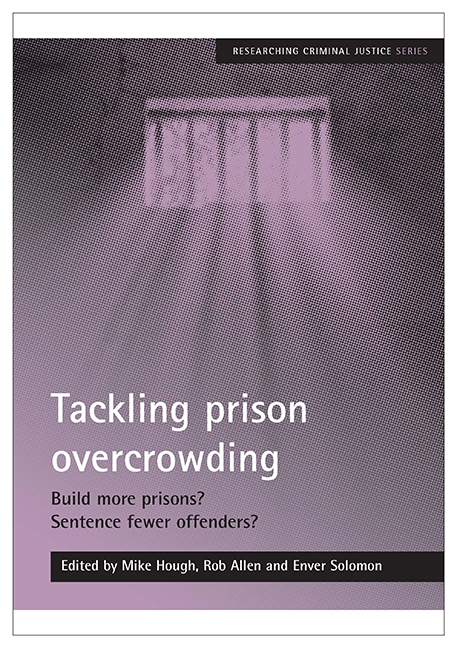Book contents
- Frontmatter
- Contents
- List of figures and tables
- Acknowledgements
- Foreword
- Notes on contributors
- 1 Introduction
- 2 The prisoners’ dilemma in England and Wales
- 3 Building on sand: why expanding the prison estate is not the way to ‘secure the future’
- 4 Towards more consistent and predictable sentencing in England and Wales
- 5 ‘Titan’ prisons: do size, efficiency and legitimacy matter?
- 6 Private punishment? An examination of the expansion, development and employment relations of private prisons
- 7 Reducing the use of custody as a sanction: a review of recent international experiences
- 8 Where now?
- 9 Endnote: latest developments in penal policy
2 - The prisoners’ dilemma in England and Wales
Published online by Cambridge University Press: 25 March 2023
- Frontmatter
- Contents
- List of figures and tables
- Acknowledgements
- Foreword
- Notes on contributors
- 1 Introduction
- 2 The prisoners’ dilemma in England and Wales
- 3 Building on sand: why expanding the prison estate is not the way to ‘secure the future’
- 4 Towards more consistent and predictable sentencing in England and Wales
- 5 ‘Titan’ prisons: do size, efficiency and legitimacy matter?
- 6 Private punishment? An examination of the expansion, development and employment relations of private prisons
- 7 Reducing the use of custody as a sanction: a review of recent international experiences
- 8 Where now?
- 9 Endnote: latest developments in penal policy
Summary
There [has] developed a war between the main political parties as a result of which the criminal justice system in general and prisons in particular have been the ultimate victims. One headline-grabbing change after another has followed, regardless of whether the system had sufficient resources properly to implement them. (Lord Woolf, reported in The Guardian, 17 March 2008)
Across the developed world today, we see striking contrasts in the level and quality of imprisonment. In 2006, imprisonment rates per 100,000 of the population ranged from about 36 in Iceland to a staggering 725 in the US. It is generally agreed that these differences cannot be explained in terms of crime rates, which – unlike levels of imprisonment – have risen and fallen over the last 50 years in broadly similar ways in most advanced democracies. And while the humanity of prison conditions and the constructiveness of prison regimes cannot be so neatly assessed, there is plenty of evidence to suggest a similarly wide cross-national variation along these dimensions (see Whitman, 2003 ; Cavadino and Dignan, 2006).
In a recent book (Lacey, 2008), I argued that these variations in punishment can be explained in terms of a differentiated model of varying forms of capitalist economy and democracy. Individualistic ‘liberal market economies’ such as the US, the UK, Australia and New Zealand have, over the last 50 years, almost universally seen striking increases in the imprisonment rate, while ‘coordinated’ market economies such as those of northern Europe and Scandinavia have seen, by and large, much more stable levels of imprisonment. In this country, we have experienced a rapid and continuing rise in punishment in the last 30 years (albeit that, happily, at 148 per 100,000 our imprisonment rate continues to be much nearer in scale to other European countries than to the US). In essence, I argue that the liberal market economies have found themselves in the grip of what we can loosely characterise as a ‘prisoners’ dilemma’, in which electoral arrangements and other institutional features of economic and political organisation have created a situation in which the strategic capacity for political and economic coordination necessary to reduce punishment is lacking.
In this paper, I focus on two specific questions. First, what can a comparative political economy analysis tell us about the purposes of imprisonment in this country?
- Type
- Chapter
- Information
- Tackling Prison OvercrowdingBuild More Prisons? Sentence Fewer Offenders?, pp. 9 - 24Publisher: Bristol University PressPrint publication year: 2008



